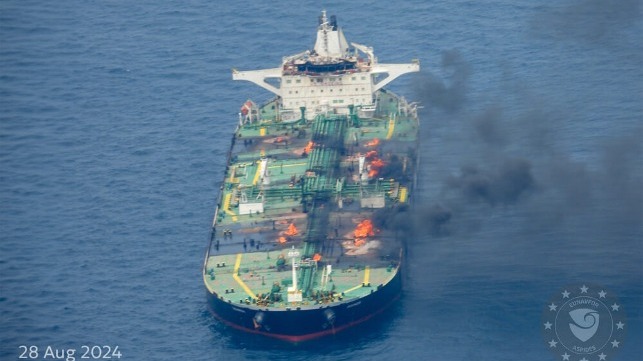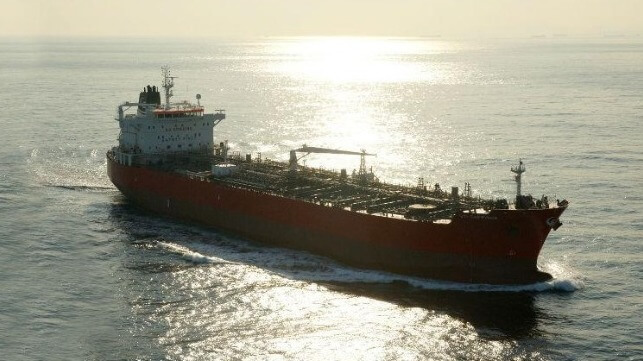
Sept. 2 (UPI) -- A salvage operation for an immobilized and burning oil tanker in the Red Sea where Houthi rebels have been attacking commercial and military vessels is about to commence, Europe's military mission in the region said Monday.
The Greek-owned and Greek-flagged MV Delta Sounion with some 1 million barrels of crude oil on board was attacked by the Iran proxy militia early Aug. 21 as it was en route from Iraq to Greece via the Red Sea.
Its crew of two Russian and 23 Filipino sailors was evacuated, and the ship was abandoned. At least five fires have since been observed burning on the vessel around the hatches of its oil tanks, with officials warning the ship and its oil contents pose not only an environmental but navigational hazard.
Pentagon officials late last month said previous salvage operations were thwarted by Houthi threats of attack while voicing concern that the vessel appears to be leaking oil.
Related
Pentagon: Houthi-attacked tanker is leaking oil
EU military operation rescues crew of Greek oil tanker hit by Red Sea attack
Eunavfor Aspides, the European Union's military operation in the Red Sea, maintains that there is no visible sign of an oil spill.
On Monday, it announced that salvage operations conducted by third parties were to begin, though specifics were scant.
The EU military mission said in a statement that it will provide tug boats for the operation and "facilitate their efforts to prevent an environmental disaster."
It said that the vessel poses "a significant environmental threat" due to the quantity of oil it is holding.
Embolden by Israel's war in Gaza, the Houthis of Yemen have since mid-November been enforcing a military blockage of the Red Sea and Gulf of Aden by attacking merchant vessels as well as U.S. and British military ships that attempt to transit the all-important trade route.
The Iran proxy militia claims the blockade is in solidarity with the Palestinian people of Gaza.
The Houthis have seized at least one ship, sunk two and killed four sailors amid its roughly 150 attacks on vessels during its blockade.
The announcement came as two unidentified merchant vessels in the Red Sea were hit, according to the United Kingdom Maritime Trade Operations.
One was struck by two projectiles early Monday about 70 nautical miles northwest of Saleef, Yemen. The second was struct about five hours later near the first attack, about 58 nautical miles west of Al Hudaydah, Yemen.
Neither vessel suffered casualties and both were continuing to transit to their next port of call.

Another merchant vessel was seemingly attack in the Red Sea, the United Kingdom Trade Organization said Monday. Image courtesy of United Kingdom Trade Organization/Release
Sept. 2 (UPI) -- A merchant vessel transiting the Red Sea where the Houthi Rebels of Yemen have been attacking ships was struck by two unknown projectiles early Monday, the United Kingdom Maritime Trade Operations said in an advisory note.
The maritime observation agency said the vessel was hit about 70 nautical miles northwest of Saleef, Yemen. A third explosion was also reported in close proximity to the vessel.
"Damage control is underway," the agency said, citing the ship's master.
No casualties were reported onboard and the ship is proceeding to its next port of call, it said.
The ship was not identified.
The Iran-backed Houthis, embolden by Israel's war against Hamas, have been enforcing a military blockade of the Red Sea and Gulf of Aden since Mid-November, attacking vessels that transit the region. they claim it is in solidarity with the Palestinian people of Gaza where Israel is waging war against the other Iran proxy militia.
The rebels have seized one vessel, sunken two and killed at least four sailors amid the blockade, which has seen the Houthis launch some 150 attacks at commercial and military ships.
Salvage Plan Prepared as Greecearns of Oil Leak from Soun

The salvage plan is being prepared with a salvage team organized as they race against time to prevent an environmental disaster in the Red Sea from the burning Greek tanker Sounion. After contradictory statements and images from the various authorities regarding a possible leak, Greece submitted an urgent notice to the International Maritime Organization late on Thursday, August 29.
“According to a satellite image obtained evening hours of 29 August 2024 by the Satellite Services of European Maritime Safety Agency (EMSA), a potential spill of about 2.2 nautical miles length has been detected. The position of the oil spill matches with the location of the ship,” said the urgent notice from the Director General for Shipping of Greece.
The vessel is loaded with 150,000 tons of crude oil and the fires started by the Houthi appear to be spreading to additional tanks based on the images. However, there has been some speculation that the first oil leaks might be from the bunkers and the damaged engine room of the vessel. The Houthis’ video showed several holes above the waterline in the hull from the series of attacks.
The Dutch company Boskalis confirmed that it “has been asked to help salvage the tanker Sounion,” according to a report in the Dutch newspaper De Telegraaf. A spokesperson for Boskalis said that SMIT is capable of carrying out such a salvage but noted the dangers from the Houthi attacks and unrest in the region. In addition to the fires that were set in the tanks, there are fears that there could be additional explosives on the Sounion.
Boskalis’s SMIT salvage group undertook the operation aboard the FSO Safer in the same region before the hostilities. They successfully transferred the oil to a new tanker and cleaned the FSO Safer in preparation for its removal for scrapping. The UN operation however was not completed because of a need for additional funds and the start of the attacks by the Houthis in November 2023.
Salvage teams are expected to approach the Sounion and begin a survey to confirm the plan which would either focus on a ship-to-ship transfer or attempting to move the tanker. Reuters is quoting unnamed sources saying the first efforts could begin over the weekend.
“Greece urges all nations and all actors involved to assist in preventing the environmental hazard and resolving the situation the soonest possible,” says the statement attributed to Rear Admiral H.C.G. Lagadianos Nikolaos.
Greek Foreign Minister Georgios Gerapetritis told reporters that he spoke with the Saudi Arabian Foreign Minister and that they were coordinating efforts. Bloomberg is reporting that Saudi Arabia would oversee the transfer of the oil while both Bloomberg and Reuters are saying the tanker will be moved to Djibouti.
The Houthis said on Thursday that they would permit a salvage attempted but denied a statement from Iran that there would be a ceasefire. As if to prove the point, late on Friday the Houthis fired two missiles at an unidentified merchant ship in the Gulf of Aden. Reports to UKMTO said the first landed in the water 50 meters from the bow and a second was to the stern of the vessel. The ship was not hit and continuing on course.
Houthis Step Up Attacks After Denying Iran’s Statement Last Week of

Several vessels have come under attack from the Houthis after the militant group denied last week a statement from Iran that there would be a pause to salvage the burning Greek tanker Sounion. The Houthis have vowed not to interrupt the salvage effort, but said they would continue targeting other ships.
Today’s primary target appears to be a Greek-owned, Panama-registered shuttle tanker transiting south in the Red Sea. The vessel, Blue Lagoon I (148,533 dwt) reported being hit by two projectiles which were later confirmed to be missiles. The tanker was displaying a message on its AIS saying it was carrying a Russian-origin cargo and coming from the Russian terminal of Ust-Luga on the Baltic Sea.
The vessel was proceeding but the UK Maritime Trade Operations said that “damage control” was underway. The tanker was approximately 70 nautical miles northwest of Saleef, Yemen. Later it was reported that there was a third explosion near the vessel. UKMTO was informed there are no causalities. The speculation is that the vessel was targeted because its managers, Sea Trade Marine of Greece, have sent other vessels to Israel.
Following the targeting of the Blue Lagoon I, a Saudi-owned and registered tanker, Amjad (298,886 dwt) northbound in the Red Sea reported it was hit by an aerial drone. The crude oil tanker which is loaded with as much as two million barrels of oil is managed by Bahri and was transmitting its AIS signal. It was near the Blue Lagoon I prompting speculation that it was not the target for the attack. The vessel reported it was proceeding.
Late on Friday, the Houthis also resumed attacks on a Liberian-registered, Greek-managed containership. The vessel, Groton, was first attacked on August 3 sustaining damage and diverting to Djibouti. Shortly after departing Djibouti while the vessel was 130 nautical miles east of Aden, Yemen two missiles exploded near the vessel late on Friday night, August 29. Unconfirmed reports are that the vessel might have again experienced minor damage.
The Houthis took responsibility for Friday’s attack on the Groton highlighting that they were continuing to target the same ship because of the shipping company’s business with Israel. The Houthis late on Monday also highlighted the attack on the Blue Lagoon I as part of their campaign against companies working with Israel. There was no mention of the drone strike on the Saudi vessel.
U.S. Central Command also issued a series of updates on new intercepts. On August 31, they said an aerial drone and an uncrewed surface boat had been destroyed. The previous day they said two aerial drones had been intercepted and the day before that an aerial drone and a missile. These were the first intercepts announced by CENTCOM since August 23.
This latest wave comes as unconfirmed reports from Greece said the salvage efforts of the Sounion commenced midday on Monday, September 2. The reports indicated three warships from the EUNAVFOR Aspides operation are positioning to protect the Sounion and two tugs were due to arrive at the burning tanker later in the day on Monday. The tow is expected to proceed slowly with the speculation being that they will go to Djibouti, but for security reasons, few details are being released.
































